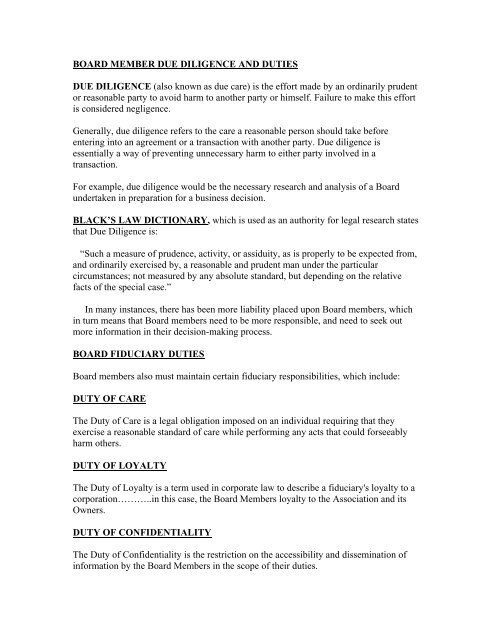Board Member Due Diligence and Duties
Board Member Due Diligence and Duties Board Member Due Diligence and Duties
BOARD MEMBER DUE DILIGENCE AND DUTIESDUE DILIGENCE (also known as due care) is the effort made by an ordinarily prudentor reasonable party to avoid harm to another party or himself. Failure to make this effortis considered negligence.Generally, due diligence refers to the care a reasonable person should take beforeentering into an agreement or a transaction with another party. Due diligence isessentially a way of preventing unnecessary harm to either party involved in atransaction.For example, due diligence would be the necessary research and analysis of a Boardundertaken in preparation for a business decision.BLACK’S LAW DICTIONARY, which is used as an authority for legal research statesthat Due Diligence is:“Such a measure of prudence, activity, or assiduity, as is properly to be expected from,and ordinarily exercised by, a reasonable and prudent man under the particularcircumstances; not measured by any absolute standard, but depending on the relativefacts of the special case.”In many instances, there has been more liability placed upon Board members, whichin turn means that Board members need to be more responsible, and need to seek outmore information in their decision-making process.BOARD FIDUCIARY DUTIESBoard members also must maintain certain fiduciary responsibilities, which include:DUTY OF CAREThe Duty of Care is a legal obligation imposed on an individual requiring that theyexercise a reasonable standard of care while performing any acts that could forseeablyharm others.DUTY OF LOYALTYThe Duty of Loyalty is a term used in corporate law to describe a fiduciary's loyalty to acorporation………..in this case, the Board Members loyalty to the Association and itsOwners.DUTY OF CONFIDENTIALITYThe Duty of Confidentiality is the restriction on the accessibility and dissemination ofinformation by the Board Members in the scope of their duties.
BOARD MEMBER DUE DILIGENCE AND DUTIESDUE DILIGENCE (also known as due care) is the effort made by an ordinarily prudentor reasonable party to avoid harm to another party or himself. Failure to make this effortis considered negligence.Generally, due diligence refers to the care a reasonable person should take beforeentering into an agreement or a transaction with another party. <strong>Due</strong> diligence isessentially a way of preventing unnecessary harm to either party involved in atransaction.For example, due diligence would be the necessary research <strong>and</strong> analysis of a <strong>Board</strong>undertaken in preparation for a business decision.BLACK’S LAW DICTIONARY, which is used as an authority for legal research statesthat <strong>Due</strong> <strong>Diligence</strong> is:“Such a measure of prudence, activity, or assiduity, as is properly to be expected from,<strong>and</strong> ordinarily exercised by, a reasonable <strong>and</strong> prudent man under the particularcircumstances; not measured by any absolute st<strong>and</strong>ard, but depending on the relativefacts of the special case.”In many instances, there has been more liability placed upon <strong>Board</strong> members, whichin turn means that <strong>Board</strong> members need to be more responsible, <strong>and</strong> need to seek outmore information in their decision-making process.BOARD FIDUCIARY DUTIES<strong>Board</strong> members also must maintain certain fiduciary responsibilities, which include:DUTY OF CAREThe Duty of Care is a legal obligation imposed on an individual requiring that theyexercise a reasonable st<strong>and</strong>ard of care while performing any acts that could forseeablyharm others.DUTY OF LOYALTYThe Duty of Loyalty is a term used in corporate law to describe a fiduciary's loyalty to acorporation………..in this case, the <strong>Board</strong> <strong>Member</strong>s loyalty to the Association <strong>and</strong> itsOwners.DUTY OF CONFIDENTIALITYThe Duty of Confidentiality is the restriction on the accessibility <strong>and</strong> dissemination ofinformation by the <strong>Board</strong> <strong>Member</strong>s in the scope of their duties.
DUE DILIGENCE IN PRACTICE FOR BOARDS:Have written policies <strong>and</strong> procedures in place.Use <strong>Due</strong> <strong>Diligence</strong> checklists for certain issues.Take time to always fully discuss the issues.Obtain the cooperative effort of both the <strong>Board</strong> <strong>Member</strong>s <strong>and</strong> Management.Exercise Patience <strong>and</strong> thoroughness.Obtain expert assistance, such as attorneys, accountants, appraisers, investigators,<strong>and</strong> insurance agents, when the circumstances dictate it.Use due diligence before there is a problem, not as a reaction to something gone wrong !WHAT BOARD MEMBERS NEEDTO EXCERSIZE DUE DILEGENCE:Information, Information, Information………Accessibility to management.Cooperation (it is not <strong>Board</strong> vs. Management)Time, Time, Time……. to discuss issues.Enough time to get educated on the issues.Enough time to consider the possible ramifications.Management must consider the <strong>Board</strong>’s point of view.Management should include the <strong>Board</strong> on its ideas early on concerning any majordecisions <strong>and</strong> plans………with no surprises to the <strong>Board</strong>.TYPICAL SITUATIONS WHERE BOARD DUE DILIGENCE IS UTILIZED;Important ContractsRefurbishmentsLong-Range PlanningFinance <strong>and</strong> AccountingLarge VendorsSales ProgramsBOARD DUE DILIGENCE:Does not mean “rocking the boat”.Does not mean that Management is not being trusted.Does not mean that Management’s decisions are being questioned.Does not mean that the <strong>Board</strong> wants to manage.IT DOES mean that the <strong>Board</strong> is interested in doing what is best for the owners that itrepresents, together with management.<strong>Board</strong> members usually volunteer because they really care about the property, have ahistory of helping <strong>and</strong> being on boards, <strong>and</strong> enjoy working with others.The <strong>Board</strong> is not in place to micro-manage, <strong>and</strong> does not have the time to consider that.



